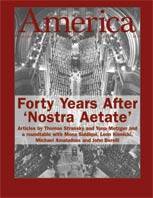The Catholic Church is unique in having a magisterium, a hierarchical structure through which declarations on teachings can come formally from “the center.” This, however, raises the question of who exactly is being addressed in those declarations that are reaching out to other faiths. In this contemporary age of rather frenzied interreligious dialogue, it may be easy to forget that the declaration made by the Catholic Church at the Second Vatican Council was a groundbreaking and innovative point in the church’s relations with people of other faiths. Yet, in its relations to Islam, the document Nostra Aetate reflects a very carefully worded text, in which the specific tension lies in according respect to the religion while withholding acknowledgment of any real legitimacy.
In opening up this opportunity for dialogue, however, it is evident that the Catholic Church realized the wisdom and imperative of engaging in theological and social reflection with people of other faiths. It is perhaps this very historic receptivity that needs to be nurtured today in practical as well as theological ways. Today, there is much talk about pluralism and diversity, as if these concepts were in themselves worthy social contexts. But we need to nurture and cultivate these social contexts if we are to be able to think of civil societies in global terms. Interreligious dialogue has a role to play in this very process. While there seems to be little or no methodology behind many dialogue settings, the ethos for such occasions is about providing a space for mutual learning. If there is any integrity in the process, the difficulty of affirming salvation for the other should not be the stumbling block to learning from the other. More important, our complacency about our own faith is challenged as we open ourselves up to deeper and diverse ways of looking at themes and concepts that resonate across faiths.
Dialogue is not about selling our respective theologies; it is about exploring our respective theologies through a common journey. Perhaps this is where the spirit of Nostra Aetate resonates the most. Whether it is our theology, our ethics, our politics or our historical context that compels us to recognize and speak with the other, it is only by this recognition that we can hope to make the world a more inclusive space for all. The theological differences between religions, especially Islam and Christianity, should not be ignored. Many Muslims and Christians may not even agree that they worship the same God. But the adherents of both faiths should hold on to a simple truth, which is that we draw nearer to God when we draw respectfully nearer to each other. The Catholic presence in dialogue settings, the willingness to face challenges despite all obstacles, is essentially a recognition of this.








